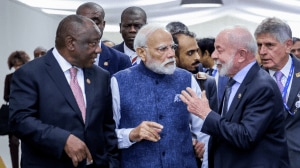First milestone: India, US to sign Vision Document’
NEW DELHI/DHAKA, MARCH 20: United States President Bill Clinton formally begins his five-day state visit to India Tuesday with the two sid...

NEW DELHI/DHAKA, MARCH 20: United States President Bill Clinton formally begins his five-day state visit to India Tuesday with the two sides signing a political Vision Document’ that sets out the future course of bilateral relationship despite differences over the nuclear issue.
Clinton left Bangladesh Monday night, ending a day’s visit to one of the world’s poorest countries.
Clinton was the first United States President to travel to Bangladesh and he used the visit to showcase efforts to raise income, promote education and reduce child labour.
Clinton will be accorded a ceremonial reception Tuesday at Rashtrapati Bhavan where he will be received by President K R Narayanan, Vice President Krishan Kant and Prime Minister Atal Bihari Vajpayee.
After placing a wreath at the samadhi of Mahatma Gandhi at Rajghat, the US President will hold intensive talks with Vajpayee covering the entire gamut of Indo-US ties, non-proliferation and the Jammu and Kashmir issue besides regional and international matters of mutual concern.
Broad contours of Washington’s views that are expected to figure during the parleys were outlined by Clinton who said he would call for restraint by both New Delhi and Islamabad on the nuclear issue and suggest to both the neighbours to resume their dialogue stalled since last year’s Kargil incursions by Pakistan.
A new direction to bilateral relations, cooperation in Information Technology and trade and commerce would be the three main components of the Vision Document’.
Minister of State for External Affairs Ajit Kumar Panja told a television chyannel the political document to be signed during Clinton’s India visit would focus on a new sense of direction to bilateral ties and expansion of cooperation in IT sector between the two countries.
The third major component of the document covers trade and commerce, he said.
Security in the Capital was further beefed up Monday, ahead of Clinton’s visit, even as extreme Left outfits continued their protests.
Police detained over 300 "anti-social elements" in thecity’s Northern Districts to prevent any untoward incident during Clinton’s visit to Mahatma Gandhi’s samadhi at Rajghat, Joint Commissioner of Police Suresh Roy told PTI.
Two activists of Communist Party of India (Marxist-Leninist) Red Flag were arrested while pasting anti-Clinton posters. They were later let off, police sources said.
The entire route from Maurya Sheraton Hotel to the places the US President is scheduled to visit, including Parliament House, Hyderabad House, Rashtrapati Bhavan, Ashoka Hotel and Rajghat were thoroughly sanitised by anti-sabotage teams. Police presence all along these routes has been further strengthened.
Though Clinton left early in the morning for Bangladesh, security in and around the Maurya hotel, where the Presidential entourage is putting up, remained tight.
Activists of CPI (ML) New Democracy paraded Clinton’s effigy through several industrial areas in the city and set them afire protesting against US imperialism’.
Social activist and Arya Samaj leader Swami Agnivesh will sit on a fast from Tuesday in protest against the visit.
Earlier, in Dhaka, the US and Bangladesh decided to intensify cooperation in trade and energy sectors, with Washington pledging $ 97 million as food aid to the impoverished country.
Clinton, who had an hour-long meeting with Bangladesh Prime Minister Sheikh Hasina, also announced $ 14 million in assistance to the country to help it reduce child labour and improve working conditions.
"Today only we begin the partnership" in trade and other spheres and economic ties between the two countries would be strengthened, Clinton, the first US President to visit Bangladesh after its independence in 1971, told reporters here.
Sheikh Hasina welcomed the new US food assistance as also a $ 84 million programme to promote clean energy initiatives for Bangladesh, India and Nepal, with some $ 50 million to fund trade initiatives.
She said the two countries have agreed to intensify cooperation on developing Bangladesh’s vast natural gas reserves but ruled out export of gas till the domestic requirements were met for 50 years.
"On the question of export of gas, our position remains that after fully meeting our domestic requirements and ensuring gas reserves for 50 years for use of future generations, the remaining surplus gas will be used for export," she said.
Hasina’s comment was a virtual disappointment to US and British petroleum companies and the World Bank which have been urging the country to open up its largely untapped gas resources for export.
The opposition in Bangladesh has warned against leasing gas fields to foreign companies and exporting gas to India.
As the US President arrived in Dhaka amid unprecedented security, some 400 students at Dhaka University protested against American "imperialism", saying that Clinton "is here to rob our natural resources."
Clinton, who was given a warm welcome on his arrival on a day-long visit by Bangladesh President Shahabuddin Ahmed and Sheikh Hasina, appreciated the recent ratification of the Comprehensive Test Ban Treaty (CTBT) by Dhaka.
Hasina requested Clinton to expedite the deportation of three killers of the country’s founding father Sheikh Mujibur Rehman now living in the US.
A Dhaka court has sentenced to death 15 former army officials, including the three believed to be in the US, for the 1975 assassination of Mujibur Rehman.
"We stressed that the killers have terrorist links and that they should not be given refuge in the greatest democracy of the world, a country that upholds the rule of law," Sheikh Hasina said.
"I am touched by President Clinton’s sympathetic response," said Hasina, who is daughter of Mujibur Rehman.
Earlier, security concerns forced cancellation of Clinton’s visit to a nearby Joypura village, where the locals were to showcase a highly-successful micro-credit programme that has made Bangladesh a model for raising living standards among the world’s poorest through small, collateral-free loans.
Officials cited "credible threat" of danger from flying over unguarded forest and rice fields as the reason for the cancellation.
Also scrapped was a wreath-laying ceremony at the national martyr’s memorial honouring the Bengalis who died fighting for independence from Pakistan in 1971.








- 01
- 02
- 03
- 04
- 05























